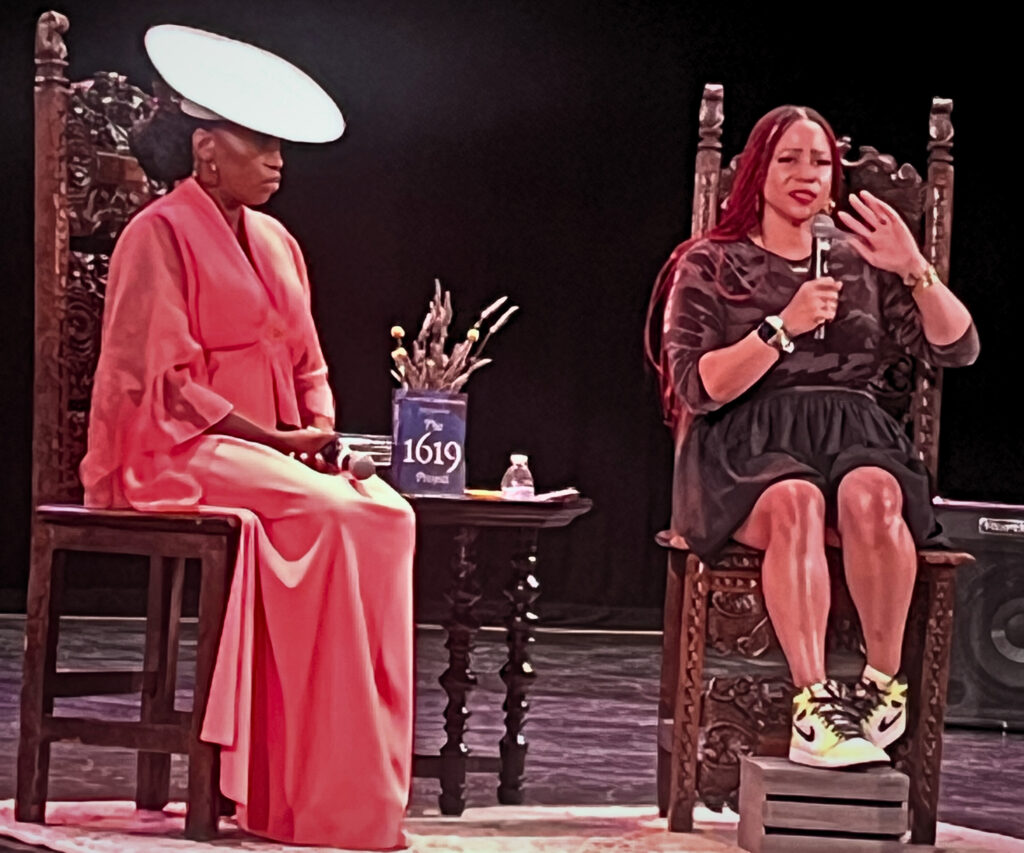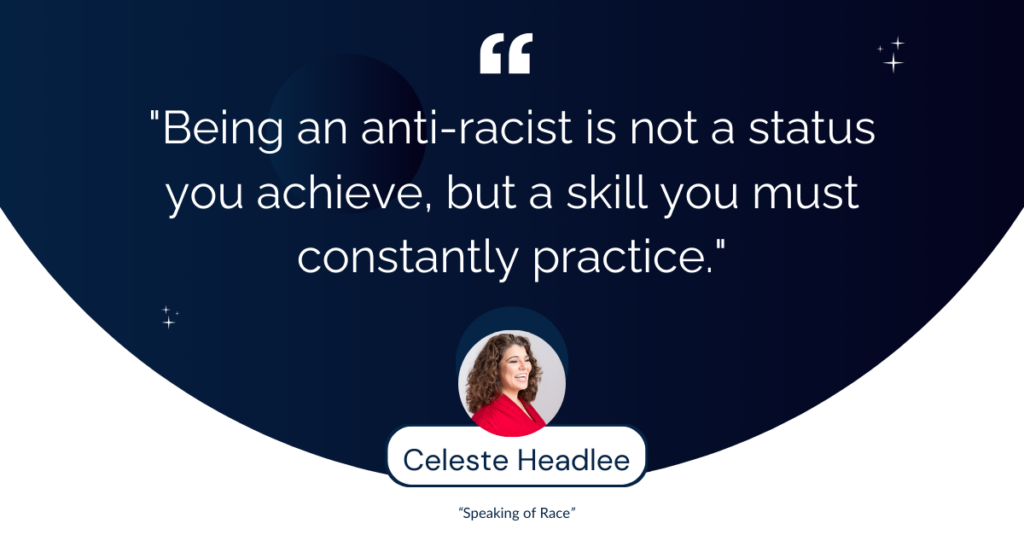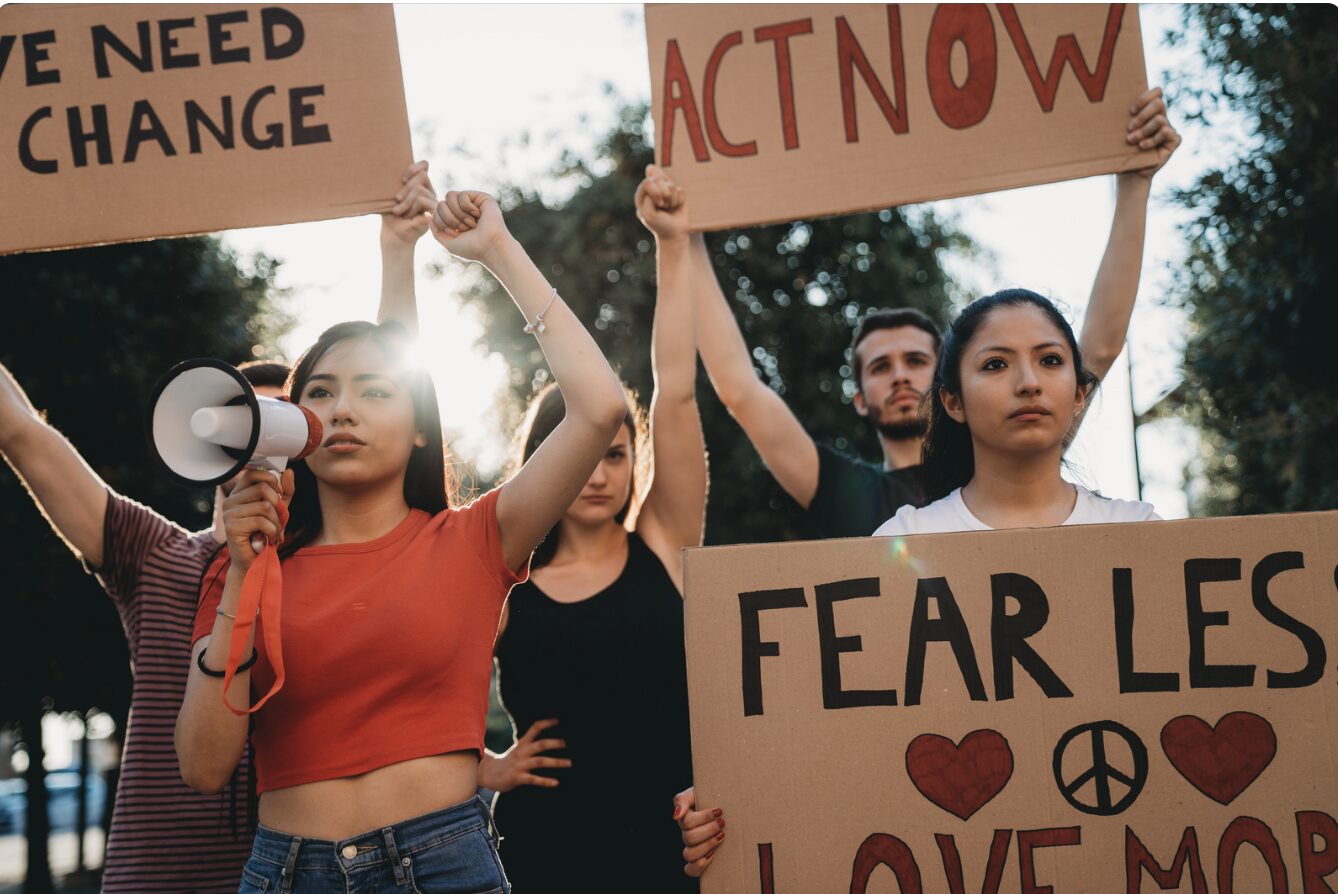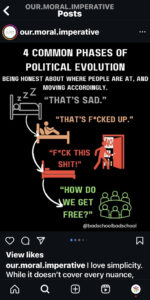Nikole Hannah-Jones, the Pulitzer Prize-winning, MacArthur Genius behind The 1619 Project, has been on tour celebrating the paperback release of the book. She held a truth-telling session with Ida’s Bookshop in Collingswood, NJ to remind us and enlighten us of the realities of the original sin of the United States. At one point, bookstore owner Jeannine Cook brought up the disproportionate suspension rate of Black and brown students in New Jersey and asked: “What are WE actually gonna do?!”
Hannah-Jones reminded us, and more specifically, “well-meaning white folks,” that it’s one thing to hold the same values and it’s another to engage in actions that reflect those values. We often look at “red” states and southern states as the bastions of segregation, conveniently overlooking that the northern states also enacted de-facto segregation through policies like redlining and other property ownership and housing laws that continue to affect society today. As they say: “In the South, the white man doesn’t care how close you get, as long as you don’t get too high. In the North, he doesn’t care how high you get, as long as you don’t get too close.” (This has been loosely attributed to Black civil rights leaders).
 We find ourselves again in an era, in which policy prevails in regards to rolling back the civil rights of all humans in this country. As soon as people of color—and Black people in particular—make progress, the reactionary response is backlash. Tear that progress down. The Tulsa Massacre of 1921. The Wilmington Coup of 1898. The Atlanta Race Massacre of 1906. The crackdown on the Black Panthers during the civil rights movement followed by the War on Crime and War on Drugs. The Tea Party, and subsequently Donald Trump after Barack Obama’s presidency.
We find ourselves again in an era, in which policy prevails in regards to rolling back the civil rights of all humans in this country. As soon as people of color—and Black people in particular—make progress, the reactionary response is backlash. Tear that progress down. The Tulsa Massacre of 1921. The Wilmington Coup of 1898. The Atlanta Race Massacre of 1906. The crackdown on the Black Panthers during the civil rights movement followed by the War on Crime and War on Drugs. The Tea Party, and subsequently Donald Trump after Barack Obama’s presidency.
And now we’re seeing a fierce backlash after publication of The 1619 Project and the Summer of Justice.
According to a press release from June 28, Rep. Alexandria Ocasio-Cortez, Vice Ranking Member of the Committee on Oversight and Accountability, led Committee Democrats in examining the Equal Employment Opportunity Commission (EEOC) and its work to enforce Title VII of the Civil Rights Act of 1964. This effort was happening while Republicans intensified attacks diversity, equity, and inclusion (DEI) initiatives in the workplace, eroding progress made on civil rights and equity in America.
“For a race of people who have suffered, endured, and survived 100 years of Jim Crow, 200 years of slavery, oppression, deprivation, degradation, denial, and disprivilege—that’s the original sin. And in an era of smaller vision, rampant apathy, and celebrated mediocrity, we do need people who will stand up and speak out for that and fight back against that which is wrong,” said Rep. Kweisi Mfume (D-Md.).
If you’re reading this, you’re likely well aware of the number of anti-DEI and anti-LGBTQ bills being introduced around the country—both federally and within state legislatures.
They seem endless.
To see and read some of these bills in their entirety—or even just their summaries—is overwhelming to say the least.
Between January 2023 and March 2024, more than 80 anti-DEI bills (some estimates are as high as 100) in 28 states had been introduced, many targeting colleges and universities. Add that to the number of bills rolling back voting rights or the Supreme Court decision that overturned affirmative action, nor those recent SCOTUS decisions whose consequences will trample human rights.
In her opening statement, Ocasio-Cortez highlighted that “this resistance to integration in every part of society, whether it be in schools, or housing, or the workforce, is an attempt to destroy the progress we have made toward a more equal and just society.”
So we came here to ask: what are we going to do? What are you going to do? What are you doing?
“Being an anti-racist is not a status you achieve, but a skill you must constantly practice.”

If racism is an infinite spectrum, and we are all born out of a racist society, then “being racist” exists on one end of the spectrum. Those of us working to fight our bigotry and our unconscious biases move forward on the spectrum, but—spoiler alert—there’s no finish line.
There’s not a point — not after reading White Fragility or How to be an Anti-Racist, or studying with The 1619 Project in its entirety or having 1,500 listening sessions with members of a marginalized community, or earning six DEIB certifications—at which any of us can confidently and accurately state that we have COMPLETED the goal and ACHIEVED the status of “anti-racist”— just as you never finish working out at the gym or brush your teeth so perfectly that you never have to do it again.
It is a skill and thus an ongoing process of learning and honing—a verb, not a noun.
And so the question of the day is: what are you doing to be anti-racist?
While DEI is often cited as reverse racism by its critics and some have even slandered it as “Didn’t Earn It,” Maya Wiley, the President and CEO of the Leadership Conference on Civil and Human Rights, reminded Committee Democrats that “When we’re talking about diversity, equity, and inclusion, we need to remember that it’s identifying unfair barriers to opportunity for highly qualified people, whether it’s promotion or hiring, as well as to ensure that employees are working well together, enjoying the workplace, and wanting to stay there. That is good for everyone, and it is non-discriminatory. It does advance our civil rights.”
A look at the numbers on book bans illustrates just how discriminate and precise the attacks are. In response to a question from Rep. Rashida Tlaib about the more than 3,000 attempts to ban books last year, Wiley cited the desire to restrict curriculum and distort history and added “PEN America has actually documented that roughly 80% of all banned book titles are written by or about people of color or LGBTQ people.”
The amount of legislation seeking to prevent trans and gender-diverse people from receiving healthcare, education, legal recognition and the right to publicly exist is exponentially greater than it was two years ago.
Trans Legislation Tracker is following 61 bills at the federal level. In 2023, 37 bills were introduced nationally.
The year 2024 has featured 617 bills in 43 states to date, including 258 carried over from 2023. That’s more than any other year on record. Of those bills: 44 have passed, 225 have failed and 348 are currently active.
After Rep. Maxwell Alejandro Frost condemned bigotry, transphobia, and attacks on the LGBTQ+ community, Wiley affirmed that “when we protect the most vulnerable, we protect everyone. The reason it is so critically important is because those protections extend to everyone. And we should remember that because it’s one of the greatest lessons that we have seen and why we should absolutely refuse to allow fearmongering.”
There is an Instagram post, shared by @badschoolbaschool and reshared by @our.moral.imperative, where we saw it. The content is not an evidence-based, scientific system that we can independently confirm, but it does serve a purpose. The graphic is titled the “4 Common Phases of Political Evolution: Being honest about where people are at, and moving accordingly.”
It attempts to chart an individual’s mindset, moving from “That’s sad,” to a willingness to work with others to make change. In between are the stages in which a person realizes the current system is unfair and then feels angry enough about the injustice to stand up and move. The final stage illustrated by the question: “How do we get free?” consists of a group of folx who are empowered, resolved, collected and focused. They are fueled by emotion, but driven by logical thought processes. They can be intentional, and through study, action, practice and reading develop new theory and strategy. It’s important to note that progression from phase to phase appears not to be one-directional.
The main point is not to shame folx for where on the spectrum they are, but to reflect as a matter of self-awareness. Responses such as “that’s sad” and “that’s [messed] up” indicate positions of isolation and disempowerment. A person may feel incapable of acting because of fear, or a low sense of self-worth, which can lead to frustration and disillusionment. It’s important to note that the author associates these two responses with a lack of context and history to whatever event is the catalyst.
We bring this up not to have you categorize yourself or feel good or bad about yourself or to judge others, but to assist you in reflecting on where you are.
How do you feel about current events and what are you doing about it?


